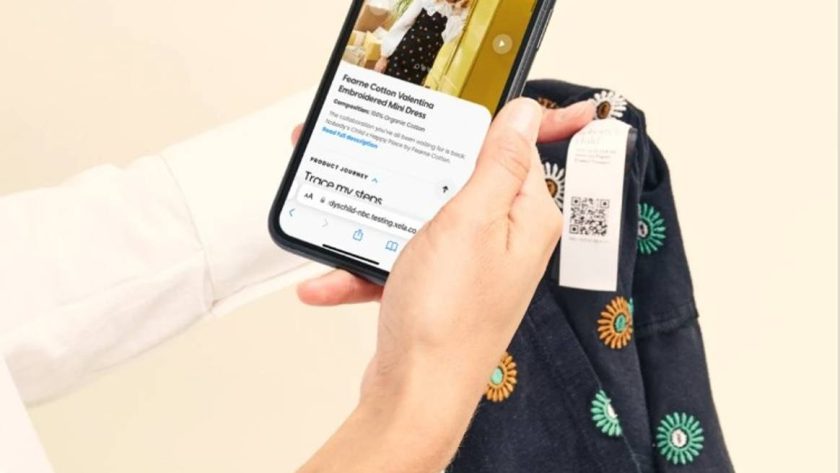Womenswear brand Nobody’s Child is taking a step towards greater transparency with the launch of digital product passports to empower customers to make more conscious and informed choices.
The technology, created by Fabacus, launches today, September 6, with the Nobody’s Child x Happy Place Collection with Fearne Cotton, where each piece will feature a unique QR code to the care label that customers can scan with their smartphones to see a detailed journey of that product’s creation.
The initial rollout will be across the Happy Place Fearne Cotton collection, available online at nobodyschild.com and Nobody’s Child stores, as well as key retail partners, including M&S, which injected fresh funding into the womenswear brand this summer.
The digital product passports have been designed with upcoming EU product transparency legislation in mind, ensuring that all key product information is captured and catalogued using Xelacore technology. Nobody’s Child has plans to have the digital product passports in place across all garments by the end of 2024.
Jody Plows, chief executive at Nobody’s Child, said in a statement: “I’m delighted to announce that Nobody’s Child has launched digital product passports. Working with Fabacus and Coinbase is a huge step forward in our journey towards full traceability and transparency.
“We know that our Nobody’s Child customer want to make conscious consumption choices, and the introduction of DPP is another move towards honesty and integrity with our community.”
Nobody’s Child collaborates with Fabacus and Xelacore to roll out digital product passports
The digital product passports are powered by Fabacus, a leading digital transformation agency, and utilise Xelacore technology to track and translate the gathering of numerous data points, such as mapping key stages of the supply chain from processing of the raw materials, through to the yarn and fabric mills, and finally to the garment factories where the final products are sewn together.
Customers will be able to scan the digital product passports via a QR code in the care label, which will take them to a landing page highlighting the product’s lifecycle carbon footprint, taking into account raw materials, finished goods manufacturing, logistics, packaging, product care and end-use. The page will also provide product care advice to help customers make their item last longer, as well as links to circular service partners, such as repair/alterations, rental and pre-loved.
Andrew Xeni, founder and chief executive at Fabacus, said: “Our mission is simple, to close the gap between brands and their customers, whilst future proofing against regulation, and growing value for both. We are thrilled that Nobody’s Child are the first to use this technology, investing one step further into full transparency. Partnering with Coinbase, who are leaders in their domain is a huge step, to utilise Web3 solutions to unlock a new level of brand control, and customer experience.”
In addition, Nobody’s Child is to incentivise consumers to trace their garments and visit their products digital product passports by offering gifts and the chance to download a unique non-fungible token (NFT) by way of a digital receipt via a collaboration with Coinbase to bridge the customer-to-brand gap.
The Coinbase partnership will enable Nobody’s Child to connect to their customers using Web3 technology, and users can store the Nobody’s Child Digital Product Passport NFT within a Coinbase digital wallet.
Richard Price, managing director of clothing and home at M&S, added: “We’re delighted to see Nobody’s Child, an important part of the M&S Family, taking the next step on their journey towards full traceability and transparency. Digital product passports are the future and we welcome the opportunity for customers to engage with the unique Nobody’s Child QR codes in our selected stores.”


